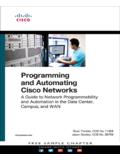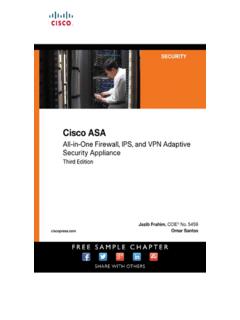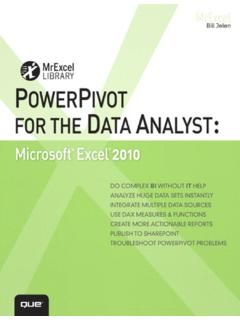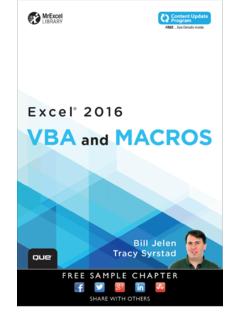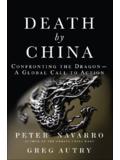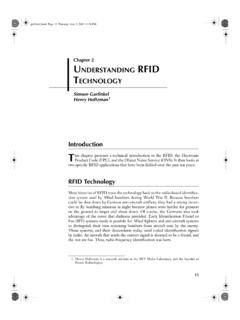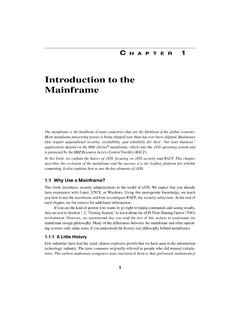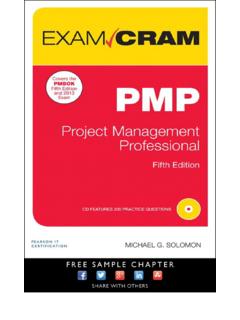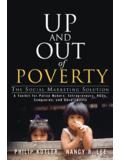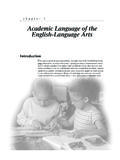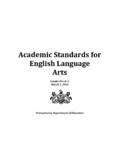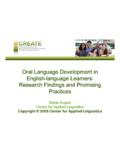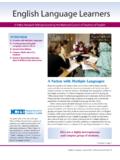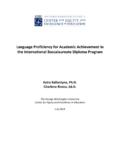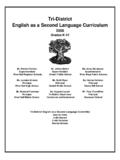Transcription of The Academic Language of History and Social Studies
1 For the past decade, Social Studies , History , government, geography, and civics have beenrelatively neglected subjects in our school systems. Because they are not required to betested through the No Child Left Behind legislation, these subjects have appeared less important than reading and math. Even science is tested now and thus has a more elevatedstatus than in the past. Time for Social Studies instruction has been cut in elementaryschools to make way for more time for reading and Language arts and/or mathematics. Social Studies has also been considered a less rigorous subject: the telling of stories, therevisiting of familiar things like your neighborhood and community workers, the sharingof information of cultures and traditions around the world.
2 History has been the story ofwar and victors, geography, map reading. And we know how successful that has been withthe ever-increasing sales of global positioning devices for vehicles!chapter 1 The Academic Language of History and Social Studies2nd proofYet, take a good look around us. All major news stories revolve around the Social sci-ences. Economics has been discussed in front page news articles since the economyfailed in 2008. The government bailout of investment banks and corporations hasmade the roles and actions of various governmental institutions highly relevant. The presi-dential election of 2008 gave rise to widespread civic activism not seen in many terrorism, international wars in Iraq and Afghanistan, civil wars in Sudan, and theinterplay of religion and territorial possession all have their origins in world disasters from tsunamis, hurricanes, and earthquakes around the world havepeople poring over maps, learning names of cities in small countries and we read news stories, we need the background knowledge from our socialstudies courses in school to interpret them.
3 We also need high levels of Academic literacybecause there are often nuances in the writing; perspectives and biases to parse. But howmuch do we remember and how well can we apply that knowledge? Consider the follow-ing from an article in the Washington Post(January 26, 2010, p. A-2):The federal debt exploded to an incomprehensible $ trillion, and the nation con-tinues on its path to becoming a wholly owned subsidiary of the People s Republic ofChina. Yet lawmakers can t even agree on a modest proposal to form an independentdebt commission and then vote on its debt commission is expected to be voted down Tuesday morning, as foes onthe far left and the far right unite to form a status quo supermajority. Prospects havebecome so bleak that a couple of retired congressional leaders got together Mondaymorning in hopes of shaming their former colleagues into understand these lines, we need to know the meanings of many terms.
4 Federal debt,wholly owned subsidiary,and debt commissionreflect economics. Lawmakers, vote, far left,far right, status quo supermajority,and congressional leadersrefer to government. People sRepublic of Chinacalls to mind geography. Thus, to comprehend these two paragraphs, oneneeds to draw on knowledge of three of the Social sciences, at least. In addition, we havepolysemous words like exploded(was there an explosion in Washington recently?) and path(are we walking along a path?), and low frequency words like modest, foes, bleak, andshamingto define. There are inferences to make about these concepts and backgroundknowledge to utilize. One needs to know, for example, that China holds much of our na-tional debt; that a supermajority in Congress means legislation won t pass so things willstay the same (status quo); that retired congressional leaders might have some clout over thecurrent members of Congress, and that the far left and the far right rarely to be well informed and active participants in our society, we need knowledgeof the Social sciences.
5 Given that, how well are our students learning History , Social Studies ,and related subjects? Although federal legislation does not require testing for these sub-jects the way it does for math, reading, and science, we do have occasional national assess-ments. The latest National Assessment of Education Progress (NAEP) exams were in 2006when a representative sample of students in grades 4, 8, and 12 were tested in History andcivics. Also in 2006, the first economics assessment was given, although only to twelfthgraders. The results are not outstanding for any of these three subjects. NAEP s perform-ance levels are labeled Basic, Proficient, and Advanced. For no subject did the majority ofthe students at any grade level score Proficient or better (Lee & Weiss, 2007; Lutkus &Weiss, 2007; Mead & Sandene, 2007) as shown in Figure Further, Hispanic studentsdid worse than White and Asian/Pacific Islander 1/The Academic Language of History and Social Studies22nd proofWhy don t more students reach the Proficient level in History , civics, or econom-ics?
6 One factor may be the reduced time available for instruction. Other factors may bethe abstract concepts embedded in the curriculum, the heavy emphasis on reading text-books and source materials, the high levels of required background knowledge, and theplethora of facts that are replete in standards and curricula. Education in the Social sci-ences involves technical terms and associated concepts, explanations, comparative andcause-effect relationships, problems and solutions. Although History can be framed in astory-like context, students won t understand the stories if they don t know the wordsand they can t make connections to themselves, to other texts, or to their world. Lan-guage plays a large and important role in learning Social Studies , History , civics, govern-ment, and being well read and well educated, we have all had experiences where webecame lost when listening to or reading about a new topic we know little about.
7 We retripped up by the terminology, phrases, and concepts that are unique to the subjectmatter. When this happens, we may become frustrated and sometimes , we do not necessarily give up. Rather, we use our skills, we access addi-tional resources, and we reach out to knowledgeable experts for the information oradvice we , every day many English learners (ELs) sit in classrooms where the topic,the related words, and concepts are totally unfamiliar to them. Even immigrant studentswith strong educational backgrounds may never have studied History or the historyof their new state. Other ELs may have familiarity with the topic, perhaps even someexpertise, but because they don t know the English words and phrases, that is, the con-tent-specific Academic Language , they are also unable to understand what is being can be compromised as well when they don t understand cause-effectsentence structures or the usage of such prepositions and conjunctions as except, unless,but, despite, or however.
8 Moreover, they have not yet mastered how to use Language andcontent resources to help them Is Academic Language ?Although definitions in the research literature differ somewhat, there is general agree-ment that Academic Language is both general and content specific. That is, many academicwords are used across all content areas (such as interpret, conflict, analyze, source),whereas others pertain to specific subject areas (constitution, revolutionary, medievalforhistory; investment, recovery,and incomefor economics; photosynthesis, mitosis, density,and inertiafor science). It is important to remember that Academic Language is more thanspecific content vocabulary words related to particular topics. Rather, Academic languagerepresents the entire range of Language used in Academic settings, including elementaryWhat Is Academic Language ?
9 3 FIGURE of Students at Proficient or Advanced Levels on the NAEP Exams in 2006 Fourth GradersEighth GradersTwelfth GradersHistory201814 Civics252432 EconomicsN/AN/A452nd proofand secondary schools. Consider the following definitions offered by several educationalresearchers: Academic Language is the Language that is used by teachers and students for thepurpose of acquiring new knowledge and skills .. imparting new information, describing abstract ideas, and developing students conceptual understandings (Chamot & O Malley, 1994, p. 40). Academic Language refers to word knowledge that makes it possible for students toengage with, produce, and talk about texts that are valued in school (Flynt & Brozo,2008, p. 500). Academic English is the Language of the classroom, of Academic disciplines (sci-ence, History , literary analysis) of texts and literature, and of extended, reasoned dis-course.
10 It is more abstract and decontextualized than conversational English (Gersten,Baker, Shanahan, Linan-Thompson, Collins, & Scarcella, 2007, p. 16). Academic English refers to more abstract, complex, and challenging Language thatwill eventually permit you to participate successfully in mainstream classroominstruction. Academic English involves such things as relating an event or a series ofevents to someone who was not present, being able to make comparisons between al-ternatives and justify a choice, knowing different forms, and inflections of words andtheir appropriate use, and possessing and using content-specific vocabulary andmodes of expression in different Academic disciplines such as mathematics and socialstudies (Goldenberg, 2008, p.)
